
Benefits of Coconut Shell Activated Carbon for Filtration and Purification Solutions
Coconut Shell Activated Carbon A Sustainable Solution for Purification
Coconut shell activated carbon has gained immense popularity in recent years due to its exceptional adsorption properties and environmentally friendly nature. Derived from the hard shells of coconuts, this unique form of activated carbon is produced through a process known as activation, which involves heating coconut shells at high temperatures in the presence of an activating agent, usually steam or chemicals. This process results in a highly porous material with a vast surface area, making it ideal for various purification applications.
One of the primary uses of coconut shell activated carbon is in water treatment. It effectively removes impurities, chlorine, and volatile organic compounds (VOCs) from drinking water, ensuring a cleaner and safer supply. Its fine particle size and high porosity allow for optimal contact with contaminants, resulting in efficient adsorption. As consumers become increasingly concerned about water quality, the demand for coconut shell activated carbon in home filtration systems is on the rise, offering an eco-friendly alternative to traditional water treatment methods.
In addition to water purification, coconut shell activated carbon is widely used in air filtration. It effectively captures odors, harmful gases, and particulate matter, making it a popular choice for residential and commercial air purification systems. The renewable nature of coconut shells means that using this material supports sustainable practices while providing health benefits by improving indoor air quality.
coconut shell activated carbon

Another significant application of coconut shell activated carbon is in the realm of industrial processes. Its ability to adsorb a wide range of chemicals makes it an excellent material for gas and liquid phase adsorption in chemical manufacturing, food processing, and the pharmaceutical industry. The use of coconut shell activated carbon can enhance product quality, reduce waste, and achieve sustainability goals in various sectors.
Moreover, the production of coconut shell activated carbon contributes to waste reduction. Instead of discarding coconut shells as agricultural waste, utilizing them for activated carbon creation promotes a circular economy. This not only minimizes environmental impact but also provides a source of income for coconut farmers and supports rural economies.
In conclusion, coconut shell activated carbon stands out as a versatile and sustainable material for purification applications. Its effectiveness in water and air treatment, along with its role in various industrial processes, positions it as an essential tool for promoting environmental health. As we strive for sustainability, adopting products like coconut shell activated carbon can significantly contribute to a cleaner and greener future.
Share
-
Premium Resin Coated Sand - High Heat Resistance CastingNewsJul.31,2025
-
High Quality Silicon Carbide Grit for Abrasive ApplicationsNewsJul.30,2025
-
High-Quality Ceramsite for Plants & Gardening | Lightweight PebblesNewsJul.29,2025
-
Premium Burgundy Glass Marbles for Vases & Shooter GamesNewsJul.29,2025
-
High Purity Quartz Sand for Industrial and Ground ApplicationsNewsJul.29,2025
-
High-Quality Barite Powder for Drilling & Industrial UseNewsJul.29,2025






